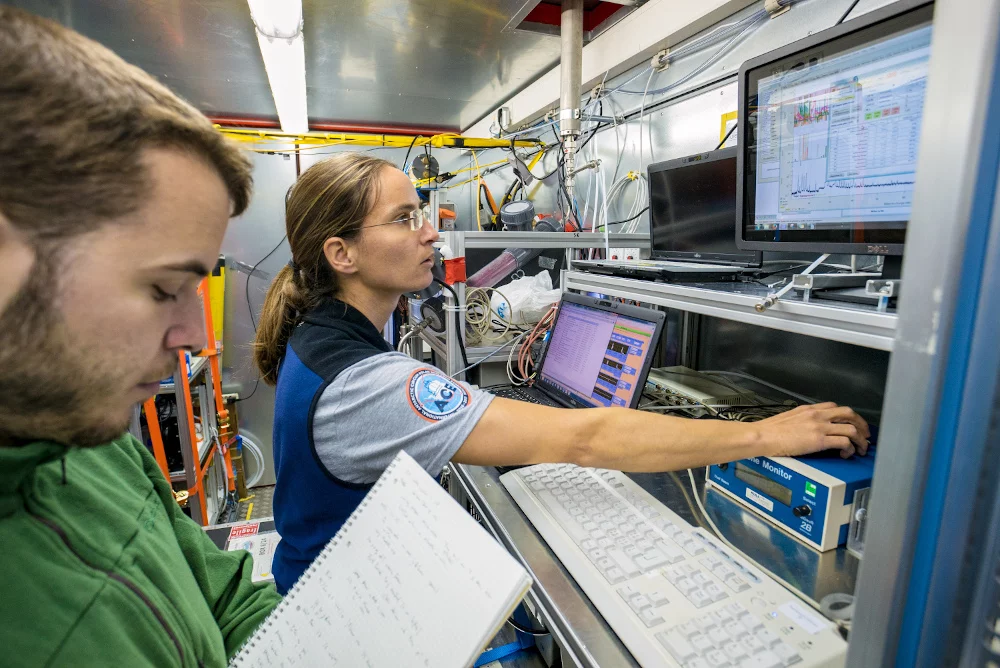PSI researchers have designed and equipped a laboratory container for operation on research ships to undertake comprehensive studies of the chemistry and microphysics of the atmosphere. The floating laboratory was first deployed during the Antarctic Circumnavigation Expedition (ACE) with the aim of characterizing aerosol processes that are relevant for climate change in an atmosphere, which is hardly influenced by human emissions of air pollutants other than greenhouse gases.
This means that the atmosphere above the Southern Ocean is one of the most pristine in the world, hence allowing the study of aerosol processes that are similar to conditions before the industrial revolution. Quantifying preindustrial aerosol-climate effects is important, because it is the baseline against which the current human-made climate forcing is calculated.
For the project “Study of Preindustrial-like Aerosol Climate Effects” (ACE-SPACE) PSI researchers from the Laboratory of Atmospheric Chemistry teamed up with colleagues from the UK, Germany and Israel to perform ship-based measurement during the circumnavigation, to complement those with satellite retrievals and to use the new data to model the preindustrial atmosphere thereby reducing uncertainty of radiative forcing in climate model simulations.
In a recent publication Schmale et al. report first results including from regions of the Southern Ocean where aerosol characteristics had not been measured before. A main finding is that in the Amundsen and Ross Sea polynyas (areas of open water in sea ice) aerosols that can form cloud droplets, cloud condensation nuclei (CCN), carry a strong signature from phytoplankton emissions. This suggests that phytoplankton blooms close to the Antarctic continent might contribute more directly to cloud formation compared to other regions. A state-of-the-art global model strongly underestimates the CCN number concentration, partly due to missing chemical processes that link the phytoplankton emissions to aerosol chemical composition. The comparison of ship-based CCN data with satellite retrieved droplet number concentrations indicates that clouds are mainly fed by particles originating from the sea surface rather than from air masses above the clouds. This is another important information to constrain global models and to reduce uncertainty in present-day radiative forcing.
A series of follow-up studies is ongoing in which the actual reduction in radiative forcing uncertainty is quantified, satellite retrievals of droplets for shallow marine clouds are improved, a new parameter to improve prediction of sea spray emissions is suggested, and a comprehensive study on the abundance and sources of fluorescent (likely biogenic) particles is presented.
Contact:
Prof. Dr. Julia Schmale, Dr. Martin Gysel
Professor at EPFL, Group Leader in the Laboratory of Atmospheric Chemistry
Paul Scherrer Institute PSI, 5232 Villigen PSI, Switzerland
Telephone: : +41 56 310 41 68
E-mail: Julia.schmale@epfl.ch, martin.gysel@psi.ch
Original Publication:
Title: Overview of the Antarctic Circumnavigation Expedition: Study of Preindustrial-like Aerosols and Their Climate Effects (ACE-SPACE)
Authors: Schmale, J., Baccarini, A., Thurnherr, I., Henning, S., Efraim, A., Regayre, L. A., Bolas, C., Hartmann, M., Welti, A., Lehtipalo, K., Aemisegger, F., Tatzelt, C., Landwehr, S., Modini, R., Tummon, F., Johnson, J. E., Harris, N. R. P., Schnaiter, M., Toffoli, A., Derkani, M., Bukowiecki, N., Stratmann, F., Dommen, J., Baltensperger, U., Wernli, H., Rosenfeld, D., Gysel Beer, M., and Carslaw, K.
Acknowledgement to:
Swiss Polar Institute and Ferring Pharmaceuticals (ACE project 7), Data Science Center (project c17-02), Swiss National Science Foundation (Grant 200021_169090), ERC Grant (ERC-CoG-615922-BLACARAT), FP7 project BACCHUS (Grant Agreement 49603445)


